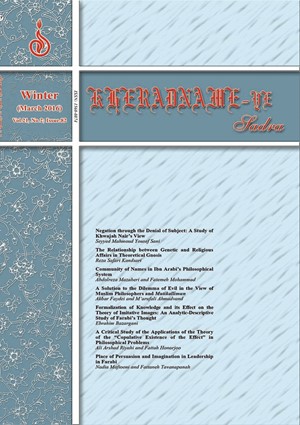-
-
List of Articles
-
Open Access Article
1 - سرمقاله
Seyyed Mohammad Khamenei -
Open Access Article
2 - Negation through the Denial of Subject: A Study of Khwajah Nair’s View
Seyyed Mahmoud Yousef Sani -
Open Access Article
3 - The Relationship between Genetic and Religious Affairs in Theoretical Gnosis
Reza Safari Kandsari -
Open Access Article
4 - Community of Names in Ibn Arabi’s Philosophical System
Fatemeh Mohammad -
Open Access Article
5 - A Solution to the Dilemma of Evil in the View of Muslim Philosophers and Mutikallimun
Akbar Faydei M‘arufali Ahmadvand -
Open Access Article
6 - Formalization of Knowledge and its Effect on the Theory of Imitative Images: An Analytic-Descriptive Study of Farabi’s Thought
Ebrahim Bazargani -
Open Access Article
7 - A Critical Study of the Applications of the Theory of the “Copulative Existence of the Effect” in Philosophical Problems
Ali Arshad Riahi Fattah Honarjoo -
Open Access Article
8 - Place of Persuasion and Imagination in Leadership in Farabi
Fattaneh Tavanapanah Nadia Maftooni
-
The rights to this website are owned by the Raimag Press Management System.
Copyright © 2017-2026







